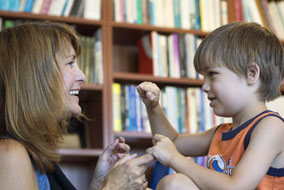
UBC professor Kimberly Schonert-Reichl with her son, Gray - photo by Martin Dee UBC Reports | Vol. 51 | No. 9 | Sep. 7, 2005
Prof Examines Baby’s Power to Teach Empathy
By Lorraine Chan
Babies are adorable, but can they also effect powerful social change?
UBC professor Kimberly Schonert-Reichl says her studies show that babies can teach children empathy and help to stem the cruelty and bullying that can snake through classrooms and playgrounds.
Schonert-Reichl is an education and counselling psychology professor who has devoted 20 years to understanding the social, emotional and moral development of children. Since 2000, she has been evaluating the effectiveness of Roots of Empathy, an innovative program that invites babies and parents into elementary schools.
“A lot of social empathy instruction is contrived. But when you bring a real live human being into the classroom, it’s really authentic. Children are invited to talk about the baby’s feelings and that legitimizes their own feelings,” observes Schonert-Reichl.
A mother of two young boys, Schonert-Reichl says it’s immensely moving to watch students bond with infants. Aimed at children between the ages of three and 14 years, the program sets up monthly visits over an entire school year.
“The kids who are the loudest, toughest, or most vulnerable, they’re the ones who connect the most with the baby.”
Roots of Empathy is delivered in eight provinces, including B.C., by a Toronto-based, non-profit organization of the same name. The program is currently running in 1,100 classrooms in rural, urban and Aboriginal communities, reaching a total of 28,500 children. More than 68,000 children across Canada have participated in the program since its inception in 2000.
To date, 150 B.C. schools have taken part in the Roots of Empathy training. The B.C. Government was so impressed with the results, it recently committed $1.27 million to expand the program to every school in the province over the next four years.
Schonert-Reichl is not affiliated with or paid by the Roots of Empathy organization, but she says it’s a privilege to test theory against such “a well-run and fantastic program.” She explains that trained instructors use the baby’s classroom visits to cue specific lessons that range from respecting others to infant development.
“I couldn’t have asked for better findings,” she says beaming. “In one of our studies, we found an 88 per cent decrease in aggression for children who participated in the Roots of Empathy program - the aggression can include behaviour such as violence, anger or gossiping.”
Schonert-Reichl stresses the program’s preventative value. “For children who had not taken part in the program, their aggression actually increased by 50 per cent.”
She says those findings came from a study that compared five Roots of Empathy classrooms with five control classrooms. Researchers conducted individual interviews with each of the 132 elementary school children prior to and after the test period. The children were asked a series of questions that tested their social and emotional understanding. As well, teachers rated the children before and after the study on nine dimensions of aggressive and positive behaviors.
Roots of Empathy founder Mary Gordon says the UBC studies have aided the program’s growth. A former kindergarten teacher, Gordon first piloted the program in 1996 at two Toronto classrooms.
“When we incorporated in 2000, we set out as one of our goals that we’d be an evidence-based organization, that although we know our program works, we would also have the data to back it up,” says Gordon.
“Well, Kim’s studies completely complement and validate our goals. Kim has set the gold standard for research. We don’t run any programs without her measurements.”
Working with Schonert-Reichl on the studies are Clyde Hertzman, a renowned UBC health care and epidemiology professor, and an extensive team of education graduate students. The project has won funding from UBC Hampton Research Grant Fund, the Human Early Learning Partnership (HELP) and the B.C. Medical Services Foundation of the Vancouver Foundation.
Directed by Hertzman, HELP is an interdisciplinary network of faculty, researchers and graduate students from B.C.’s four major universities. It links scholars, government and communities in creating and applying new knowledge about early childhood development.
The Roots of Empathy success story has triggered international interest. Japan ran a small Roots of Empathy pilot in 2003. Australian schools are currently running the program and New Zealand will launch a pilot in 2006. Gordon says UBC will play a pivotal role throughout the expansion.
“To maintain the integrity of the program and the high standards of research and evaluation, we’re using the baselines Kim has established. She’ll be co-ordinating all the data gathered on foreign soil,” remarks Gordon.
Within Canada, Schonert-Reichl says the next Roots of Empathy study will explore long-term effects of empathy training.
“We want to measure the impact on children over a three-year period after they’ve had exposure to Roots of Empathy.”
As well, Schonert-Reichl says the research team will start assessing the program’s impact on academic achievement. “We’d love to show that it not only makes you a nicer person, it makes you do better in school.”
Gordon concurs this study will affirm a true strength of the program.
“People go nuts when we say we can decrease bullying. But what’s most encouraging to me is that when children are kinder and more empathic, they’re freed up to learn. It changes the entire tone of the classroom.”
Note: Roots of Empathy founder Mary Gordon has been invited by the Talk of the Town to speak at Magee High School in Vancouver on October 3. For more information, e-mail info.talkofthetown@ubc.ca or call 604.822.5675. |
